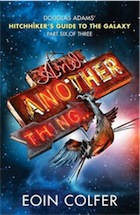And Another Thing... Douglas Adams's Hitchhiker's Guide to the Galaxy: Part Six of Three by Eoin Colfer
The Hitchhiker phenomenon has always, I suspect, been personal and subjective, not global. Depending on how you came to it – books, radio series, film – its legions of fans have always taken from it something slightly different. I always thought all the things that were meant to be "funny" – the towels and don't panic posters, the people who this weekend will wear dressing-gowns at a convention – were rubbish. The recent film didn't get the jokes at all, and even the TV series failed the instant it tried to transfer a written gag – Zaphod's second head – to the screen. No, the joy was in reading and rereading Adams's prose: the sly delight in word- and plot-play, the perfect ear, the serendipity of onomatopoeia in the English language and the careful fusion of apparently randomly loopy scenarios with insight and a Point.
Thus, when this comes along, the first book since Adams's untimely death in 2001, both excitement and trepidation are felt. Eoin Colfer, author of the hugely popular teen Artemis Fowl series, has been sanctioned in the project by Adams's widow, and there has been great expectation, but also a great many people going, quietly, good Lord, it would be so easy for him to get it wrong – one hint of a tin ear, one echo of a cracked bell and it's doomed.
Within pages, it's clear this is a triumph. Colfer has pulled off the near-impossible. It's faithful to Adams's humour and, more important, it's also got his rhythm, the cadences and the footfalls that made his style so often (badly) imitated. But Colfer doesn't shy from introducing his own brand of wit, his own complex logic confettis. It's the work of an author who can write anyway, with a beautiful, vaulting imagination, and who obviously loves Adams's style so much he can echo it without falsity or accidental parody. There is not a lazy sentence.
It is also, as it were, updated. It would have been wilful of Colfer not to acknowledge the changes that have taken place in our, the allegedly real, world since Adams's first book was published 30 years ago – the internet and, in general, our far greater sophistication with computers – so he's unafraid to bandy about talk of downstreaming and uploading.
There's not much, this time round, of Arthur Dent. This is perhaps inevitable, in that Arthur was, basically, in his mild grumpiness and faint air of confusion, Adams himself. There's a welcome return for Arthur's daughter, Random, who's busy raising teenage truculence to new levels and, what's more, getting to do so on a bewildering new array of planets.
It's picky to say the plot makes no sense. It makes as much sense as any plot would which involved the likes of warring gods, three or four alternative earths, a corrupt joke-Irish property developer, a complex battle involving a cheese-based deity and a young Vogon damned by the possession of aesthetic sense and, worse, a conscience.
If there's any downside to this mainly fabulous first effort, it's that there's just too much of it. The real Adams books were increasingly short, I think. So Long and Thanks for All the Fish, for instance was, I seem to remember, of such staggering slimness that you had to quickly read it three times in succession – not a problem – to get your money's worth. Here, for all its fitful brilliance, there's simply too much, even of the fitful brilliance. It's too long, the "Guide" footnotes are too comprehensive, the "further reading" gags too frequent.
But these quibbles were a struggle to find and even the sainted Adams wasn't above the occasional infuriatingly indulgent longueur, such as basing the whole of his least good book on an extended metaphor involving cricket. Colfer has given us a delight, and an eye-opener, and hope, and, close as this book does on the line "The end of one of the middles", the near-promise of more to come.


Comentários